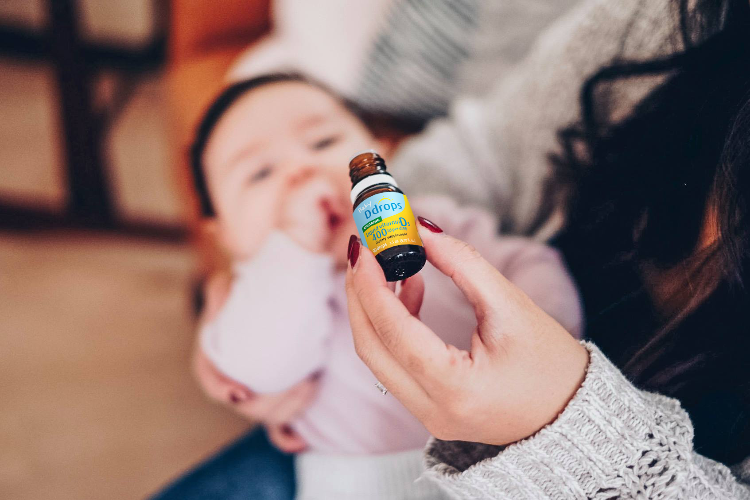August 16, 2016
Do Ddrops® products have a taste? This is a question we get asked quite frequently! A research study was developed to see what physicians have to say.
Summary:
A qualitative market research study was conducted with physicians to gather feedback on taste and impact on feeding after trying a daily dose of an infant liquid vitamin D supplement, Baby Ddrops®. Twenty-five participants agreed to ingest a dose of Baby Ddrops® and provided their uncensored feedback. Each individual had positive comments and they all felt that the dose did not have a taste, and it was small enough to not interfere with infant feeding. This study highlights the importance of healthcare professionals to consider the taste and administration of infant products.
Introduction
Newborn infants have a highly developed sense of taste. Sensitivity to sweet and bitter tastes is present at birth, but reactions to salty foods don’t come until about 5 months. Physicians and nurses make recommendations to parents about infant and childcare, including vitamin supplementation. Healthcare practitioners do not always have an opportunity to experience these products personally first hand. The focus of this study is to gather qualitative observations and opinions about the taste and administration of Baby Ddrops® from pediatricians during a short focus group study.
Baby Ddrops® is the number one infant vitamin in Canada and is growing in market share throughout the U.S. Baby Ddrops® are designed to be licked off a clean surface, such as mother’s nipple during feeding. The excipient oil used in Baby Ddrops® was carefully chosen for several reasons, including the bland taste compared to other long-chain triglycerides oils (e.g., olive oil). Other infant vitamin preparations include added flavors, colors, and preservatives that can make administration to infants and children quite a challenge. One daily dose of Baby Ddrops® is a single drop (0.028 mL). An infant will nurse up to 750 mL per day. A daily dose of Baby Ddrops® is therefore as little as 0.0037 per cent of the volume ingested by a nursing infant, representing a very small amount in comparison to the amount an infant would normally consume.
Problem statement
What do pediatricians think of product taste and impact on infant feeding after experiencing Baby Ddrops® themselves during a focus group?
Research objectives
The goal of this market research study is to gather qualitative feedback from pediatricians about the suitability of Baby Ddrops® administration to infants. Feedback should be gathered on taste, size of the drop, and the impact on this administration during infant feeding.
Research method
This research study involved individual pediatricians and small groups conducted while attending a pediatric continuing education course in 2015. Healthcare professionals were able to visit exhibits and collect information prior to lectures and during the breaks. After explaining features and administration of Baby Ddrops® to physicians, they were asked if they were willing and interested in tasting a dose of Baby Ddrops 400 IU/drop and if they would be able to provide some qualitative feedback. There was no reward or compensation offered or provided to the participants recruited for this study. A total of 45 healthcare professionals were briefed on Baby Ddrops® at this program, of which 25 agreed to taste the product and share their feedback on the experience. Each individual was given a single drop of Baby Ddrops®, administrated with a small plastic sampling spoon and then they could comment on the taste, volume, and general experience. Names of participants along with their comments were recorded on site. The average time for each individual participation and information gathering was approximately 8 minutes.
The participant sample
The following describes the demographic profile of the participants:
- Healthcare practitioners, including Pediatricians, Family Physicians, and Pediatric Nurses in practice for under 5 years
- 24 of 25 Participants practice medicine in the United States (1 in Canada)
- Age range was 30-50
- 17 of the 25 participants were female
Findings:
After sampling a drop of Baby Ddrops®, participants were asked to provide feedback, in their own words about the experience, and to specifically comment on the taste and the impact on feeding. The table below captures the feedback:
| Initials | State | Verbal Feedback |
| D.A. | VA | “There really is no taste at all, it definitely won’t interfere.” |
| Y.M.F. | MI | “Wow it really has no taste and totally won’t interfere with feeding.” |
| Z.S. | IL | “There really is not a taste so how could it interfere with anything?” |
| C.W. | IL | “I can’t believe how tasteless it really is. This will not interfere at all.” |
| R.G. | IN | “This will not interfere with anything because there really is no taste.” |
| J.K.B. | IN | “I was skeptical but this really has no taste.” |
| M.R. | WI | “These really do not taste like anything at all, the child wouldn’t even notice its there.” |
| S.M. | NC | “A little bit oily but that’s it. There really is no bad taste left in your mouth.” |
| A.M. | OH | “I can’t believe that a vitamin tastes like nothing. This will not interfere with feeding at all.” |
| J.E.R. | CA | “There really is no taste at all, my patients would be happy.” |
| Z.T. | IN | “No taste makes this a great option.” |
| M.J.B. | VA | “Since there is no taste the child won’t even know it is there.” |
| V.P.L. | IL | “This really does have no taste and the drop is so small the baby won’t even notice.” |
| A.K. | OK | “Wow, no taste and just one tiny drop is so easy.” |
| O.A. | SK., CA | “I can’t believe it! It has no taste… baby won’t even know” |
| C.S.K. | MI | “Great for mom and baby” |
| A.S. | IL | “This is great and baby won’t notice” |
| L.F. | TX | “Right on the nipple, what a great idea.” |
| M.R.B. | IN | “Baby won’t taste anything.” |
| E.L. | IL | “Not even a taste so baby won’t know.” |
| R.T. | FL | “This is great and has no taste at all.” |
| K.M. | IL | “Wow, really no taste so it won’t interfere with anything.” |
| J. L. | IL | “No taste so the child won’t even notice.” |
| M.D. | MI | “No taste at all, won’t interfere.” |
| R.M. | TX | “There really is no taste, so this is great.” |
These comments demonstrate positive reports on the first-hand experience, specifically taste and the impact on infant feeding. Results show that pediatric healthcare practitioners feel that it is interesting to experience infant products personally before recommending them to their patients.
Recommendation for future [quantitative] research:
Based on these qualitative research findings, opportunities exist for a larger quantitative study to provide more specific statistics such as percentage of participants detecting a taste, and percentage of healthcare practitioners who personally try pediatric products. Infants and small children are not always able to describe their opinion on sensory experiences like taste, therefore more consideration should be given to minimizing taste of pediatric products.




Để lại một bình luận
Trang web này được bảo vệ bằng hCaptcha. Ngoài ra, cũng áp dụng Chính sách quyền riêng tư và Điều khoản dịch vụ của hCaptcha.